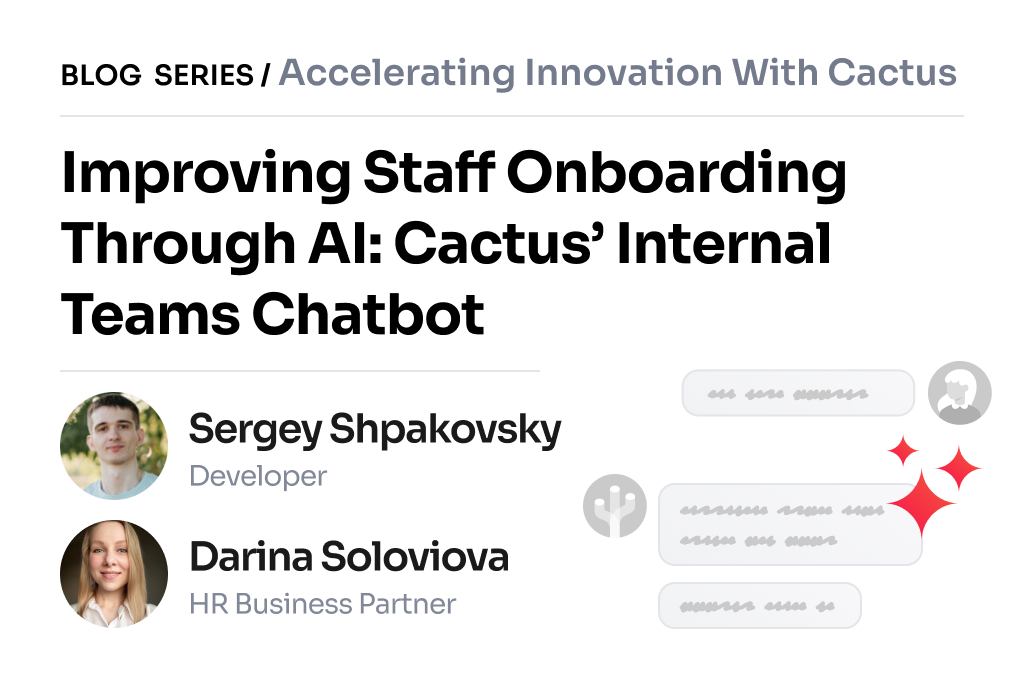Have you heard the story about the MSQRD app, which was used by Jimmy Kimmel on his show and was later bought by Mark Zuckerberg? Maybe you know Viber and use it daily? Or perhaps you have seen the World of Tank ads that were translated during the Super Bowl, the USA’s most popular TV show? All these things have something in common – they were made in one small country, which you may not have known until now.
The IT industry is one of the newest branches of the Belarusian economy, however it can already be said that it is a base for the country’s future. A few years ago, it was hard to believe that such world-famous giants like Apple, Intel, IBM, Facebook, Microsoft, Google, and Amazon.com would use services produced by Belarusian developers, and that Belarus would be called the Silicon Valley of Eastern Europe.
With a population of 9.5 million people, the Republic of Belarus is really not a big country, yet it is now transforming into a tech hub. But what did you know about it before? Belaz’s huge mining dump trucks, its the first and only President, Mark Shagal, world-famous sportspeople such as Darya Domracheva and Viktoria Azarenka – that’s almost the complete list of celebrities ‘made in Belarus’. But wait, Ralph Lauren’s parents, and the grandparents of Michael Douglas were immigrants from Belarus, though even locals rarely know about this.
There are no valuable resources nor access to the sea here in Belarus, which is why imports have often exceeded exports, making the country economically dependent on the neighbouring countries. However, the situation is completely different within the IT industry – more than 1100 companies provide 14% of all services exported by the Republic (according to the stats for 2016).
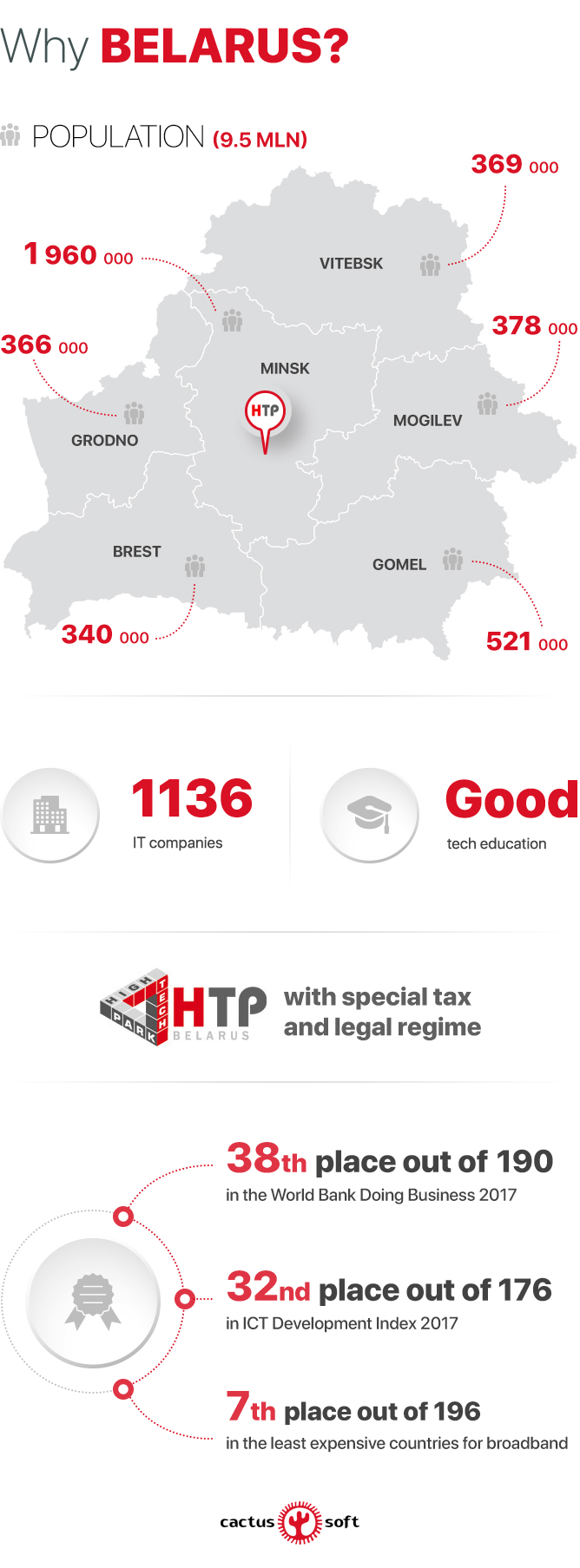
Such impressive development has been led by a powerful educational system, which has focused on tech specialities. More than 80,000 students graduate in Belarus annually.
“Belarus has a reputation of a country with a high scientific potential. This reputation is not gained overnight. It takes 50–60 years to establish a strong education system with highly qualified faculty. Today we can see the huge potential of the Belarusian IT industry and are ready to invest in its development”
Cliff Reeves, General Manager at Microsoft
Starting in 2005, Hi-Tech Park has been operating in Belarus. It is a kind of economic zone with a special and legal regime, and is the focal point for talented developers from all over the country. The principal preference of its members is to take full advantage of the park’s benefits without actually maintaining a physical presence within the park.
More than 190 companies are resident there – EPAM Systems, IBA Group, Game Stream (better known as Wargaming.net), Itransition, Viber Media and many others, including CactusSoft. Six of them were listed in The 2017 Global Outsourcing 100. Every year, new successful projects have appeared in Hi-Tech Park: World of Tanks, MSQRD, Viber, Maps.me, Prisma, Apalon Apps, and so on.
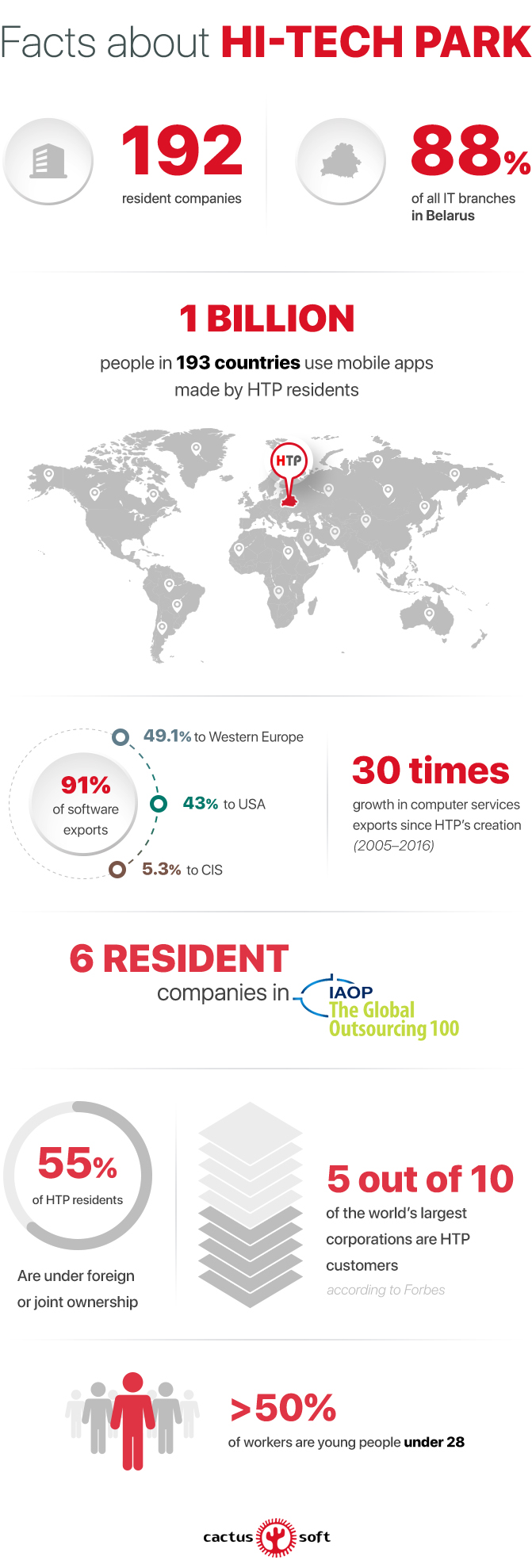
You definitely know these names
More than 90% of IT services produced by HTP are developed for outsourcing. Nonetheless, many world-famous projects have been made under Belarusian development. Let’s check if you know them.
Viber
In 2010, social media expansion mushroomed, people created profile pages anywhere they could, and it seemed that nothing new could be invented. Two Israeli men, Igor Magazinnik and Talmon Marko, accepted this challenge. They met in the army and decided to make an app for Internet calls, which would be different from Skype. So, that was the story behind the appearance of Viber, the app with 900 million regular users all over the world.

Why is Viber often named as a Belarusian development? The offices of the technical development and user support departments are based in Belarusian cities – Minsk and Brest – and the company itself is a resident of Hi-Tech Park. The choice of country-developer wasn’t made accidentally, according to Magazinnik. American programmers are not flexible and require much bigger salaries (up seven times higher). In January 2014, the Japanese electronics company Rakuten enthusiastically bought Viber for 900 million dollars. The developers’ second popular app is Juno, now one of Uber’s main competitors. Its development center is also based in Minsk and has 80 employees.
World of Tanks
Many women know this name firsthand. Exactly – women, whose husbands spend hours playing in painted tanks and enjoying this brutal game. The idea for and creation of this game fully belong to the Belarusian company Game Stream (better known as Wargaming.net). The Russian-language version was launched in 2010, and a year after that users from English-speaking countries also tried this novelty, and it was very successful. Today, World of Tanks is one of the most popular online games in the world, while Dolph Lundgren and Steven Seagal advertise it and visit its development center in Minsk.
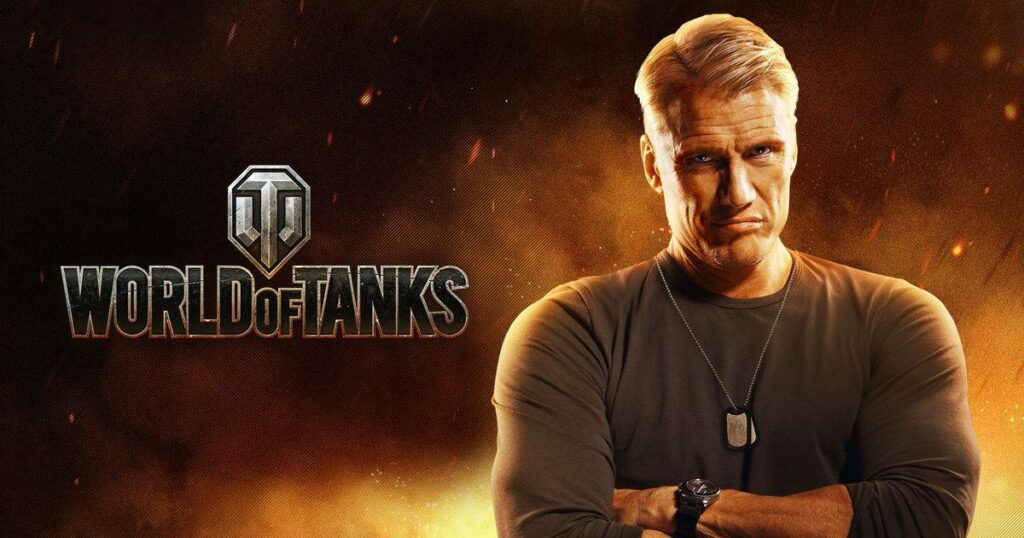
The company spends huge amounts of money on the promotion of their brilliant product. For example, in February 2017 Wargaming.net bought advertising time during the USA’s Super Bowl, the most famous and entertaining TV show in the country. World of Tanks ads were translated together with the ads of Coca-Cola, Audi, Fiat Chrysler, and so on.
In 2017, there have been 140 million users of the game, and it was awarded for being “The best game that is still played” at the Golden Joystick Awards 2017.
MSQRD
MSQRD is an app that allows you to try on various masks in real time. It was developed by the Belarusian company Masquerade Technologies – by three developers, to be more precise. One month after creation, the app had counted 1 million users without spending any money on promotion. Thanks to the viral effect, MSQRD reached the top of the ratings, its audience was increasing at a frantic pace, and its DiCaprio mask was used by Oscar ceremony guests and Leo’s mother. In 2016, Jimmy Kimmel tested MSQRD in his show, and a month later the project was bought by Facebook.
As a rule, all successful projects from Belarus leave its territory to become world-famous.
Can Belarus become an IT country?
“Very intelligent people, enthusiastic work force. It’s the one place in Europe where skilled engineers, and developers in the web and Internet come together to create new ideas. HTP is a perfect place to involve investment, because people from resident companies here are very experienced in programming. I think it is a place to be for the future”
Brad Krevoy, CEO of Motion Picture Corporation of America & Brad Krevoy Television
The year 2017 has become crucial for the IT industry in Belarus. One of the most significant laws has been recently approved by the government. This decree substantially simplifies doing IT business in the Republic.
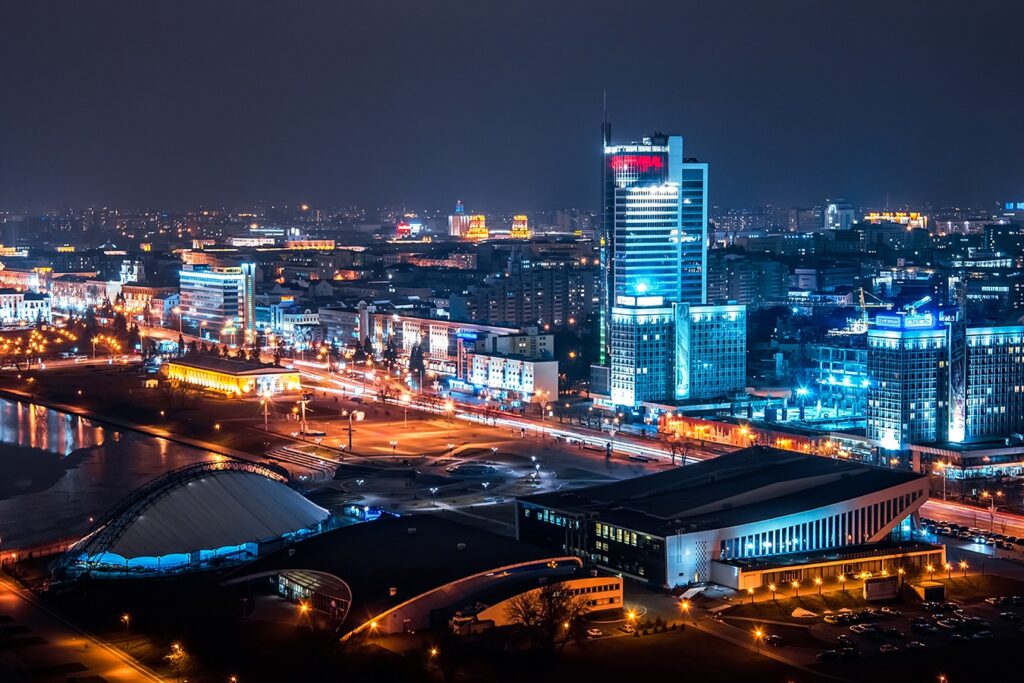
The Decree introduces an action framework, focused on the liberalisation of the business environment for the innovative and high-tech sector, including the development of the legal status of the High-Tech Park (hereinafter referred to as the HTP) residents. The following key measures are to be taken:
Unprecedented Conditions for IT companies – HTP residents
1. The validity period for HTP’s special legal status will be extended until January 2049. The following companies, which specialise in software development or other IT businesses, can become HTP residents:
- Design, development, support, sale, maintenance of software and (or) firmware based on or using the Blockchain, and distributed databases,
- Creation, training of neural networks and other algorithms in the specialised sections of Artificial Intelligence, and implementation of the results of this activity,
- Development, support, maintenance and production of unmanned vehicle driving systems,
- Development or separate development stages of medical technologies, biotechnologies as well as the implementation of the results of these developments,
- Business processes outsourcing activity,
- Software publishing and promotion,
- Mining, cryptocurrencies exchange activity, cryptocurrency converter activity, other activity using tokens,
- Cybersport activity. The list is not exhaustive. The HTP supervisory board is authorised to establish other kinds of activity that a company can specialise in to become a HTP resident.
2. Within the framework of the special HTP legal status, the existing tax and NSSF (National Social Security Fund) benefits are preserved and new ones introduced.
Among the existing HTP residents’ benefits, the major ones are as follows:
- Exemption from income tax and VAT (pursuant to the general rule). Instead, HTP residents pay 1% of gross revenues in favour of the HTP administration,
- Individual income tax is paid at a lower rate (9%), and NSSF fees are calculated according to the average country wages, instead of actual wages (3-4 times lower). Additional benefits, aiming to stimulate Product Development IT companies, are the following:
- Exemption from VAT, based on the use of foreign entities to provide marketing, advertising, consulting and some other services to HTP residents,
- Zeroing of foreign entities’ income tax rate, with respect to the income from carve-out of stocks, shares in authorised capital, participatory interest in HTP residents’ property (provided that they continuously possess it for not less than 365 days), as well as royalties, earnings from advertising services and other kinds of income, paid by HTP residents.
3. HTP residents’ activities shall be simplified. Residents shall have a right:
- To conduct operations with e-money without a range of limitations,
- To open accounts in foreign banks and other credit and financial institutions, to receive money into these accounts without the permission of the National Bank,
- Capital can be moved through currency transactions if conducted after notifying the National Bank and with their permission,
- To execute primary accounting documents personally, when performing business transactions with non-residents of the Republic of Belarus.
Regulations regarding the procedure for the conduct and control of foreign trade transactions do not apply to transactions made by HTP residents.
4. Investment according to English Law will be allowed. HTP residents are allowed to sign agreements with third parties that are actively implemented in international business.
For example:
- Agreement on granting right of first refusal to execute contracts,
- Convertible loan agreements,
- Property loss indemnity agreements,
- Agreements, stipulating liability for labour pirating,
- Non-compete agreements with employees with payment of compensation for the period of noncompete obligations,
- To issue irrevocable power of attorney.
5. The set of measures, focused on attracting top-ranked IT-specialists, is finalised.
- HTP residents do not have to get the permissions related to the employment of foreigners. Foreign employees will receive a temporary residence permit under the simplified procedure,
- Visas for foreign employees and founders of the HTP residents are cancelled. The maximum time limit of their temporary stay is increased up to 180 days.
Cryptocurrencies and Tokens are put into circulation in Belarus
Belarus will create an unprecedented ecosystem for the regulation of the circulation of cryptocurrencies and tokens. Major provisions:
- The rights of physical and legal entities in terms of token circulation are defined. Legal entities are entitled to possess tokens, create and list their own tokens through HTP residents; buy, exchange tokens and perform other operations using tokens only through the cryptocurrency exchanges and cryptocurrency exchange operators.
- Individuals are entitled to possess tokens; perform mining; exchange tokens, buy and sell them for Belarusian rubles, foreign currency, e-money, as well as present and bequeath tokens. The mining activity of individuals, tokens purchasing and sale shall not be considered entrepreneurial activity.
- Tokens and revenues from operations with them shall not be subject to declaration by the individuals.
- Turnovers, profits (income, proceeds) from various operations with tokens are not recognised as taxable items until January 2023.
“With effect from December 22th 2017, Belarus will become one of the world’s best country from which to operate a technology business. We’ve had strong outsourcing and product companies since the creation of the High Technology Park in 2005, the new legislation propels us to the next level. Belarus is inevitably set to become the Hong Kong or Singapore of the European continent”
Viktor Prokopenya, Belarusian technology entrepreneur and venture investor






